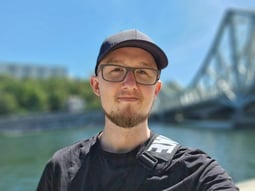What do you do?
I work as a data scientist and software developer in the AHEAD team which develops Klimator's vehicle-mounted road condition detection technology. The bulk of my work has to do with data: collecting, wrangling, and using it to train and evaluate models. I also build the software/hardware bundle that runs those models in our customers' vehicles and regularly attend meetings with both current and potential customers to provide technical insights.
How would you describe Klimator as a workplace?
Working at Klimator is challenging but stimulating and fun! The use cases and problem statements we're given as developers are usually quite open, meaning there's room for a wide array of solutions. Having so many choices can be daunting, but it pushes you to be creative and makes it all the more satisfying when you successfully pull it off. Success is often shared as we tend to work together, and being a small and relatively flat organization makes collaboration a breeze.
“Success is often shared as we tend to work together, and being a small and relatively flat organization makes collaboration a breeze.”
— Pontus Andersson, Team Lead AHEAD
What does a typical day at work look like?
My schedule is typically quite open (read: free from meetings). I like that because it leaves plenty of room for the stretches of uninterrupted deep work that are essential for the problems we tackle. In a typical week, I spend around 50-75% of my time doing development work, and the rest is mostly filled with meetings, chats, and fika.
I work mostly in front of the computer, but deploying systems into real vehicles sometimes requires us to be more hands-on. For instance, whenever bad road weather conditions occur near the office we try to head out in our demo/data collection vehicle and capture as much of it as we can. We love what people generally consider "bad" driving weather: road surface temperatures around the freezing point, heavy rain, and snowstorms. Being very hands-on with the system and going out driving in such conditions makes me feel the impact of our day-to-day activities and the responsibilities that follow.
What are the things that motivate you?
The fact that we're developing technologies that improve safety on the road, ultimately saving lives, is always at the back of my mind. Being a small but impactful startup at the forefront of the industry only amplifies that feeling. In the day-to-day, my main motivator is the heap of varied engineering challenges we face. Getting immersed in an interesting problem, sometimes for several days, to then emerge triumphantly from "The Cave" (our developer room) is a great feeling. Working on tough problems also makes you grow in many ways: theoretical know-how, practical skills, initiative, creativity, and persistence, to name a few. Sharing this struggle with colleagues and growing together is the cherry on top.
What advice would you give to someone new at this job?
Firstly, keep an open mind and try to not get tunnel-visioned on particular solutions. Don't hesitate to discuss problems with colleagues, as chances are they've encountered similar things in their work and can give helpful advice. Despite the wide range of technologies and practices used across the different teams in the company, there's a surprising amount of overlap due to the shared core domains of data and winter road weather.
Secondly, understand that everybody makes mistakes and try not to be too hard on yourself when they happen. I think mistakes should be cherished, not shamed, as they're a great opportunity to learn and improve. Working on hard problems that haven't been fully solved is very hard, creative work, and a lot of the time you'll have ideas that simply don't work out. That's just par for the course, and I don't even play golf.
